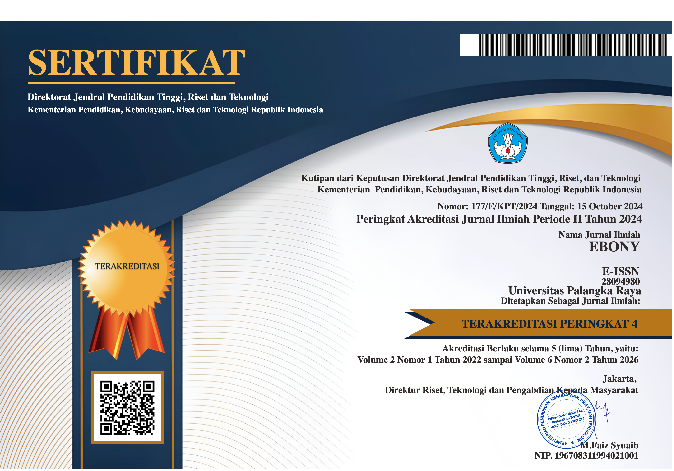Developing Students’ Interest In Learning English Through Digital Learning Platform
DOI:
https://doi.org/10.37304/ebony.v3i2.9701Keywords:
Student's interest, Digital Learning PlatformAbstract
The implementation of technology in learning is a good way to help students understand learning material. Through an interesting strategy, it will encourage students to always improve their understanding related to the implementation of learning. This study aims to obtain information about the English digital learning platform used by teachers to be able to attract students' interest and motivation in learning in EFL classes. The research was carried out qualitatively through a descriptive approach. The informants in this study were three English teachers who provided teaching through the use of digital learning platforms. Data were obtained through observation of learning and interviews with teaching implementers. Then, the data analyzed through data reduction, data display and conclusions. The results of the study show that teachers use various digital learning platforms in teaching English in order to encourage students to increase their motivation in learning English. The digital learning platforms that are used are very diverse, such as Padlet, Youtube, Canva, Kahoot, Quizizz and so on. The teacher also explained that the use of digital learning platforms was able to positively increase students' understanding in mastering learning material.
Downloads
References
Adnyani, K. E. K., Adnyana, I. W., & Murniasih, N. N. (2020). Teacher and students’ perception on using Kahoot! for English learning. https://doi.org/10.2991/assehr.k.200115.011
Bicen, H., & Kocakoyun, S. (2018). Perceptions of students for gamification approach: Kahoot as a case study. International Journal of Emerging Technologies in Learning, 13(2), 72–93. https://doi.org/10.3991/ijet.v13i02.7467
Cheng, X., Xie, H., Hong, J., Bao, G., & Liu, Z. (2022). Teacher’s emotional display affects students’ perceptions of teacher’s competence, feelings, and productivity in online small-group discussions. 12(January), 1–13. https://doi.org/10.3389/fpsyg.2021.795708
Fauzi, I. (2021). Teaching English Using WhatsApp During Learning from Home: Impacts to Students and Implication to Teachers. LET: Linguistics, Literature and English Teaching Journal. 11(2). 59-78. DOI: http://dx.doi.org/10.18592/let.v11i2.4918
Miles, M. B., Huberman, A. M., & Saldana, J. (2013). Qualitative data analysis: A methods sourcebook. Sage Publications Incorporated. https://doi.org/https://doi.org/10.1080/10572252.2015.975966
Muddin, A. (2018). The use of duolingo to improve students’ vocabulary. Thesis, 231324418.
Nikmah, H.-. (2020). Gamification to improve students’ engagement in learning English. ACITYA Journal of Teaching & Education, 2(1). https://doi.org/10.30650/ajte.v2i1.277
Prayudha.S, J. & A. P. (2023). Integrating information communication technology in English language teaching. January, 29–35.
Prayudha, J. (2022). EFL students’ perception on the use of social media platforms as learning tools. JETLi: Journal of English Teaching and Linguistics, 3(1), 1–9. https://doi.org/10.55616/jetli.v3i1.226
Prayudha S., J. (2021). Video based learning as a media for teaching English during pandemic covid-19. Journal of Language Intelligence and Culture, 2(1), 1–11. https://doi.org/10.35719/jlic.v2i1.53
Puspita, I. S. (2023). Improving Student Interests and learning outcomes for English Subject by using Mind Mapping through Online Zoom Application. EBONY: Journal of English Language Teaching, Linguistics, and Literature, 3(1), 71–82. https://doi.org/10.37304/ebony.v3i1.7580
Ramdani, N. S., Nugraha, H., & Hadiapurwa, A. (2021). Potensi pemanfaatan media sosial tiktok sebagai media pembelajaran dalam pembelajaran daring. Akademika: Jurnal Teknologi Pendidikan, 10(2), 425–436. https://doi.org/DOI: https://doi.org/10.34005/akademika.v10i02.1406
Sirisrimangkorn, L. (2021). Improving EFL undergraduate learners’ speaking skills through project-based learning using presentation. Advances in Language and Literary Studies, 12(3). https://doi.org/10.7575/aiac.alls.v.12n.3.p.65
Stake, R. E. (2010). Qualitative Research. The Giuilford Press.
Sugiyono. (2014). Memahami Penelitian Kualitatif. Alfabeta.
Downloads
Published
How to Cite
Issue
Section
License
Copyright (c) 2023 Joko Prayudha.S

This work is licensed under a Creative Commons Attribution 4.0 International License.











